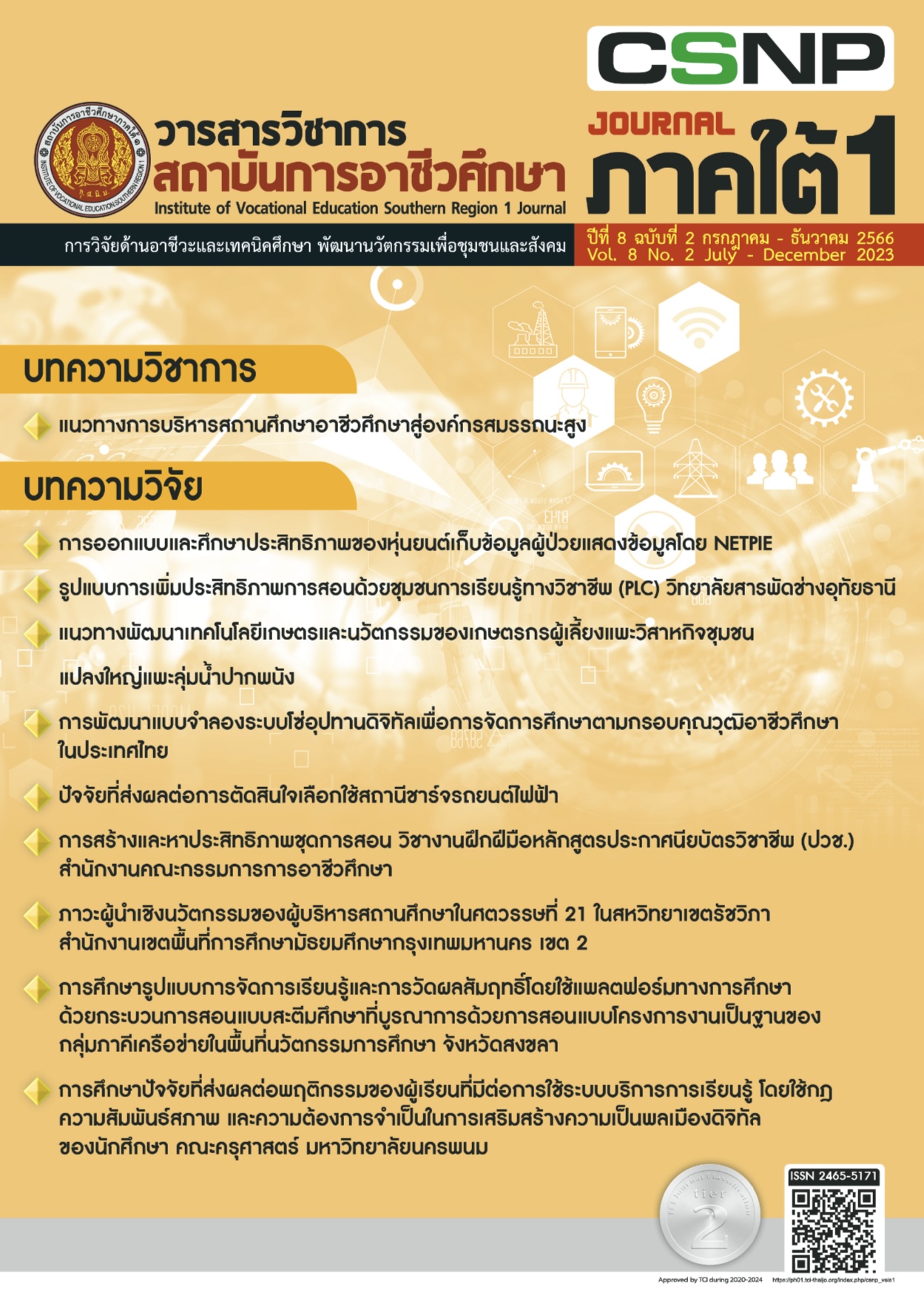รูปแบบการเพิ่มประสิทธิภาพการสอนด้วยชุมชนการเรียนรู้ทางวิชาชีพ (PLC) วิทยาลัยสารพัดช่างอุทัยธานี
คำสำคัญ:
รูปแบบ, ประสิทธิภาพการสอน, ชุมชนการเรียนรู้ทางวิชาชีพ (PLC)บทคัดย่อ
การวิจัยครั้งนี้มีวัตถุประสงค์เพื่อ 1) ศึกษาสภาพปัจจุบันและสภาพที่พึงประสงค์การสอนด้วยชุมชนการเรียนรู้ทางวิชาชีพ 2) สร้างและตรวจสอบคุณภาพรูปแบบการเพิ่มประสิทธิภาพการสอนด้วยชุมชนการเรียนรู้ทางวิชาชีพ 3) ดำเนินงานตามรูปแบบ และ 4) ประเมินผลการใช้รูปแบบ การวิจัยนี้เป็นการวิจัยและพัฒนา มี 4 ตอน ประชากรที่ใช้ในการวิจัยได้แก่ ครู วิทยาลัยสารพัดช่างอุทัยธานี จำนวน 29 คน ผู้ทรงคุณวุฒิสนทนากลุ่ม 9 คน ตรวจสอบคุณภาพรูปแบบ 7 คน เครื่องมือที่ใช้เก็บรวบรวมข้อมูล ได้แก่ แบบสอบถาม แบบบันทึก และแบบรายงาน วิเคราะห์ข้อมูลโดยการหาค่าร้อยละ ค่าเฉลี่ย ส่วนเบี่ยงเบนมาตรฐาน และการวิเคราะห์เนื้อหา
ผลการวิจัยพบว่า 1) สภาพปัจจุบันภาพรวมอยู่ในระดับมากและสภาพที่พึงประสงค์ภาพรวมอยู่ในระดับมากที่สุด 2) ผลการสร้างรูปแบบมี 4 องค์ประกอบ และผลตรวจสอบคุณภาพของรูปแบบ ภาพรวมอยู่ในระดับมากที่สุด 3) การดำเนินงานตามรูปแบบ ผลระดับการปฏิบัติ ภาพรวมอยู่ในระดับมากที่สุด ผลสัมฤทธิ์ของผู้ร่วมกิจกรรม ภาพรวมสูงขึ้น คิดเป็นร้อยละ 83.29 และ 4) การประเมินผลการใช้รูปแบบ 4.1) ความพึงพอใจของครู ที่มีต่อการใช้รูปแบบ ภาพรวมอยู่ในระดับมากที่สุด 4.2) ผลการพัฒนานวัตกรรมการเรียนการสอนของครูจากการใช้รูปแบบ จำนวน 29 เรื่อง คิดเป็นร้อยละ 100 4.3) ผลสัมฤทธิ์ด้านพัฒนาเครือข่ายจากการใช้รูปแบบ เครือข่ายชุมชนการเรียนรู้จำนวน 7 เครือข่าย คิดเป็นร้อยละ 100
เอกสารอ้างอิง
ฉัตรชัย ทองเจริญ. (2556). คุณลักษณะการเป็นชุมชนแห่งการเรียนรู้ของโรงเรียนสังกัดสำนักงานเขตพื้นที่การศึกษาประถมศึกษาอุดรธานี. วิทยานิพนธ์ ปริญญาครุศาสตรมหาบัณฑิต สาขาวิชาการบริหารการศึกษา มหาวิทยาลัยราชภัฏอุดรธานี, อุดรธานี.
วิจารณ์ พานิช. (2556). วิถีสร้างการเรียนรู้เพื่อศิษย์ในศตวรรษที่ 21. กรุงเทพมหานคร: มูลนิธิสดศรี-สฤษดิ์วงศ์.
สำนักงานคณะกรรมการการอาชีวศึกษา. (2560). แผนพัฒนาการอาชีวศึกษา. กรุงเทพมหานคร: สำนักนโยบายและแผนการอาชีวศึกษา.
วิทยาลัยสารพัดช่างอุทัยธานี. (2564). รายงานการสำรวจการขับเคลื่อนชุมชนการเรียนรู้ทางวิชาชีพของวิทยาลัยสารพัดช่างอุทัยธานี ปีการศึกษา 2564. อุทัยธานี: งานพัฒนาหลักสูตรการเรียนการสอน วิทยาลัยสารพัดช่างอุทัยธานี.
Deming, W. E. (1995). Out of The Crisis. USA: The Massachusetts Institute of Technology Center for Advanced Engineering Study.
มินตรา ลายสนิทเสรีกุล และปิยพงษ์ สุเมตติกุล. (2557). กลยุทธ์การบริหารโรงเรียนสู่การเป็นชุมชนแห่งการเรียนรู้วิชาชีพของโรงเรียนมัธยมศึกษาในสหวิทยาเขตเบญจบูรพา กรุงเทพมหานคร. วารสารอิเล็กทรอนิกส์ทางการศึกษา, 9(3), 392-406.
ชูชาติ พ่วงสมจิตร์. (2560). การสร้างความสัมพันธ์ระหว่างโรงเรียนกับชุมชน. Veridian E-Journal, Silpakorn University มนุษยศาสตร์ สังคมศาสตร์ และศิลปะ, 10(2), 1342-1354.
สหรัฐ เต็มวงษ์. (2559). ปัจจัยที่ส่งผลต่อการเป็นชุมชนแห่งการเรียนรู้ของโรงเรียนสังกัดสำนักงานเขตพื้นที่การศึกษามัธยมศึกษา เขต 19. วิทยานิพนธ์ปริญญามหาบัณฑิต สาขาวิชาการบริหารการศึกษา คณะครุศาสตร์ มหาวิทยาลัยราชภัฏเลย, เลย.
วิชัย วงษ์ใหญ่ และมารุต พัฒผล. (2562). การพัฒนาคุณภาพการจัดการเรียนรู้ตามแนวคิดชุมชนแห่งการเรียนรู้ทางวิชาชีพ. กรุงเทพมหานคร: ศูนย์ผู้นำนวัตกรรมหลักสูตรและการเรียนรู้.
ประคอง รัศมีแก้ว. (2562). การพัฒนารูปแบบชุมชนแห่งการเรียนรู้ทางวิชาชีพเพื่อเสริมสร้างสมรรถนะการจัดการเรียนรู้เชิงรุกของครูระดับการศึกษาขั้นพื้นฐาน. สุพรรณบุรี: สำนักงานเขตพื้นที่การศึกษาประถมศึกษาสุพรรณบุรี เขต 3.
บำรุง ป้องนาทราย. (2564). การพัฒนารูปแบบชุมชนแห่งการเรียนรู้ทางวิชาชีพเพื่อส่งเสริมความสามารถจัดการเรียนรู้ที่เน้นผู้เรียน เป็นสำคัญตามแนวปฏิบัติสู่ผลสัมฤทธิ์ขั้นสูง (High Impact Practices) โรงเรียนหนองโนประชาสรรค์. วารสารชุมชนแห่งการเรียนรู้วิชาชีพครู, 1(1), 45-60.
Vanblaere, B. & Devos, G. (2016). Relating School Leadership to Perceived Professional Learning Community Characteristics: A Multilevel Analysis. Ghent University, Belgium.
Rebecca, M. (2015). An Examination of Qualities of Effective Professional Learning Communities in Urban Schools. Baylor University, Texas, United State.
ดาวน์โหลด
เผยแพร่แล้ว
ฉบับ
ประเภทบทความ
สัญญาอนุญาต
ลิขสิทธิ์ (c) 2023 วารสารวิชาการสถาบันการอาชีวศึกษาภาคใต้ 1

อนุญาตภายใต้เงื่อนไข Creative Commons Attribution-NonCommercial-NoDerivatives 4.0 International License.



